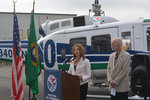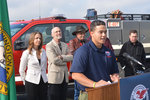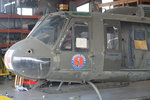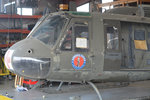



TUMWATER — Calling it an “unprecedented ask,” Washington Public Lands Commissioner Hilary Franz urged state lawmakers Wednesday to support a $55 million wildfire funding package, a total that would double the state’s wildfire fighting budget.
If the cost seems steep, Franz said, the cost of doing nothing is much higher.
“Our children are growing up in a Washington without summer,” Franz said at a press conference outside of the Department of Natural Resources helicopter maintenance hangar in Tumwater. “Our businesses are losing as people no longer come to visit some of our most precious and beautiful communities. Our environment is hurting, and it is hurting our economy. Our communities and taxpayers cannot continue to sustain the losses that our forest health crisis is inflicting on Washington state.”
Franz’s budget request would put $12 million toward hiring 30 full-time engine leaders who currently work on a seasonal basis, allowing more year-round forest work and better staff retention. Another $6 million would add a pair of helicopters to the Department of Natural Resource’s current seven-chopper fleet. The biggest portion of the plan, nearly $18 million, would be put toward fuel reduction, involving forest thinning and prescribed burns.
“This package is actually something that will save our state money in the long run,” Franz said, noting that the state has spent $1 billion responding to wildfires over the past five years.
Franz was accompanied by a pair of state representatives, Democrat Larry Springer and Republican Tom Dent, who said they will be pushing their colleagues to support the funding package. Springer said the fuel reduction measure was especially important.
“You see swaths of brown trees,” he said. “Those are roman candles waiting to go off. That’s the forest health we’re talking about, and if we can clean up that problem, we mitigate the intensity of future fires.”
Dent, a former pilot, said he knows the value of adding to the state’s helicopter response capabilities, which can snuff out fires before they quickly grow in size. He’s also come to realize that forest management is equally important.
“We’ve got 400, 500, 600 trees per acre,” he said. “The land can’t sustain that. That’s unhealthy forest. That needs to come back to 100 to 200 trees per acre that we can support. If we have healthy forest and we have a fire, more of the trees don’t die.”
Meanwhile, seasonal DNR firefighter Tommy Matsuda said the proposal would allow people in his position to contribute more to the state’s firefighting efforts.
“Making us engine leads full time could benefit our personnel as well as our forests. During the offseason, we could work on fuel reduction and perhaps prescribed fire,” he said. “I’ve seen firsthand what a fire can do in a well-maintained area versus an untouched one. It can be the difference of stopping a slow-moving, low-intensity surface fire versus stopping a freight train going 60(mph).”
Rodney Cawston, Chairman of the Confederate Tribes of the Colville Nation, said Native Americans long used fire as a management tool to retain forest health. Reinvesting in forest management could help mitigate fires like the one that destroyed a large portion of his tribe’s reservation in 2015.
“Today, we’re living with those impacts because we have mudslides,” he said. “The water quality has been impacted, the air quality has been impacted. We’re reconstructing roads, we’re reconstructing bridges. … I hope our governor and the state legislature can think about that.”
Franz said the wildfire issue has garnered statewide attention, with more than 40 percent of fires occurring on the west side of Washington in 2018.
“No part of Washington was free from wildfires this year,” she said.
The state has seen 1,700 wildfires so far this year, and Franz credited the DNR’s helicopter response with keeping 95 percent of them below 10 acres. The agency positioned its choppers strategically throughout the state during wildfire season but were spread thin “every single day,” she said. The DNR is the largest wildfire fighting force in the state, including federal responders.
While she hasn’t spoken with Gov. Jay Inslee about the proposal yet, Franz said her conversations with state lawmakers have indicated there’s broad understanding about the severity of the issue. Springer added that he’ll be bringing that message to his colleagues.
“I would rather spend a few dollars up front than a whole bunch of dollars later on,” he said. “That’s the argument we’re going to take to Olympia.”
The budget request would bring in $38 million from the operating budget and $17 million from the capital budget.